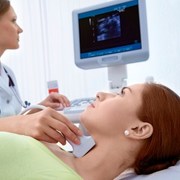
The sensitive thyroid stimulating hormone (TSH) test is generally considered to provide the most accurate measure of thyroid gland activity. In the past, physicians were unable to detect thyroid disorder until a patient’s symptoms were fairly advanced. With the sensitive TSH test, however, physicians are able to diagnose thyroid disorders.
TSH tests, due to their high degree of sensitivity, enable physicians to detect even the mildest abnormalities of thyroid function.
How the Thyroid Functions
The thyroid gland operates as part of a feedback mechanism involving the hypothalamus and the pituitary gland. First, the hypothalamus sends a signal to the pituitary gland through a hormone called TRH (thyrotropin releasing hormone). When the pituitary gland receives this signal, it releases TSH (thyroid stimulating hormone) to the thyroid gland. Upon receiving TSH, the thyroid responds by releasing two hormones, thyroxine (T4) and triiodothyronine (T3), which then enter the bloodstream and affect the metabolism of the heart, liver, muscles and other organs. Finally, the pituitary “monitors” the level of thyroid hormone in the blood and increases or decreases the amount of TSH released, which then regulates the amount of thyroid hormone in the blood.
A “Measurable” Improvement in Thyroid Tests
Prior to the introduction of the TSH test, the standard blood tests for thyroid disorders measured only T4 and T3 levels in the blood. Research has shown, however, that these hormone levels can appear relatively normal even when the thyroid is not functioning normally because the pituitary gland will under or over compensate for thyroid function. When the thyroid gland begins to fail (leading to hypothyroidism or an underactive thyroid), the pituitary gland produces higher levels of TSH to increase thyroid stimulation so the gland will produce more T4 and T3. On the other hand, when the thyroid gland begins to produce too much thyroid hormone (the sign of hyperthyroidism or an overactive thyroid), the pituitary gland sends less stimulating hormone so the thyroid will produce less thyroid hormone.
TSH testing offers a marked advance by directly measuring the amount of TSH produced by the pituitary gland. In effect, the TSH test takes advantage of the “wisdom” of the pituitary gland, the organ that first recognizes thyroid dysfunction, and therefore provides a more exact measure of thyroid function.
Beyond disease diagnosis, TSH tests play a critical role in helping physicians manage thyroid disorders. In this capacity, TSH tests are used to determine precise drug dosages for patients with hypothyroidism and hyperthyroidism, as well as to monitor changes in dosage requirements over time.
Interpreting a TSH Test
A TSH test is done by drawing a small blood sample and sending it to a laboratory for analysis. The laboratory will read the level of TSH, and based on a reported normal value range, it will determine whether the level is below normal (hyperthyroid), above normal (hypothyroid) or within the normal range (euthyroid).
People who believe they may have a thyroid disorder should ask their primary care physician or an endocrinologist to have their TSH level checked.
In support of this precise tool for measuring thyroid activity, the American Association of Clinical Endocrinologists (AACE) clinical practice guidelines strongly advocate the use of TSH tests for diagnosing thyroid conditions. For more information about TSH testing or thyroid disorders, visit the AACE web site at www.aace.com.
References:
1. Mayo Clinic. Hypothyroidism - Tests and Diagnosis. http://www.mayoclinic.com/health/hypothyroidism/ds00353/dsection=tests-a.... Accessed May 21, 2012.
2. National Institute of Diabetes and Digestive and Kidney Diseases. National Endocrine and Metabolic Disease Information Service. Thyroid Function Tests. Available at: http://endocrine.niddk.nih.gov/pubs/thyroidtests/index.htm. Accessed July 16, 2010.
3. American Thyroid Association. ATA Hypothyroidism Booklet. Falls Church, Va: American Thyroid Association; 2003.
4. AACE Thyroid Task Force. American Association of Clinical Endocrinologists medical guidelines for clinical practice for the evaluation and treatment of hyperthyroidism and hypothyroidism. Endocr Pract 2002;8:457-469.




Add a CommentComments
There are no comments yet. Be the first one and get the conversation started!